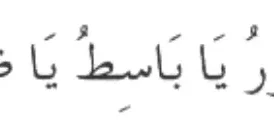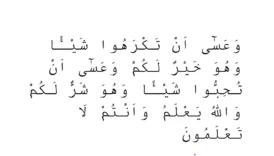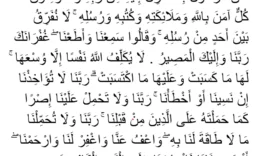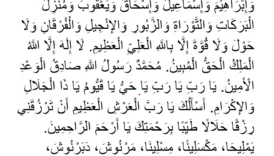Ayatul Kursi: Recitation, Meaning, Virtues, and About Everything
Ayatul Kursi is the 255th verse of Surah Al-Baqarah and describes the unique attributes, power, and knowledge of Allah. It is known for its recitation, meaning, virtues, and being recited for purposes like protection. You can find every detail about Ayatul Kursi in this content.
- Ayatul Kursi: Recitation, Meaning, Virtues, and About Everything
- What Is Ayatul Kursi?
- Ayatul Kursi Arabic Script
- Ayatul Kursi Recitation (English Transliteration)
- Listen to Ayatul Kursi
- Ayatul Kursi Meaning (Translation)
- Virtues and Benefits of Ayatul Kursi
- Explaining Allah's Greatness and Attributes
- Protection from Satan (Shaytan)
- Protection from the Evil Eye (Nazar)
- Bringing Blessings (Barakah) and Peace
- Glad Tidings of Paradise
- Other Virtues
- Why Is Ayatul Kursi Recited?
- Protection (From Satan, Evil Eye, Accidents, Calamities)
- For Healing (Shifa)
- For Peace and Relief
- To Remember Allah and Draw Closer to Him
- For Blessings (Barakah)
- How Many Times Should Ayatul Kursi Be Recited?
- After Every Obligatory (Fard) Prayer
- Before Sleeping
- Reciting Specific Numbers
- Hadiths and Narrations About Ayatul Kursi
- Final Word
- Bibliography
What Is Ayatul Kursi?
My brothers and sisters, Ayatul Kursi is the 255th verse of Surah Al-Baqarah, which is described as the heart of the Holy Quran. It takes its name from the word “Kursi” mentioned within it, which expresses the infinite power and sovereignty of Allah Almighty. The Kursi symbolizes His knowledge, dominion, majesty, and greatness. This blessed verse declares the oneness of Allah (Tawhid), that He is Al-Hayy (The Ever-Living) and Al-Qayyum (The Sustainer of all existence), that He is free from slumber and sleep, that whatever is in the heavens and whatever is on the earth belongs to Him, that no one can intercede with Him except by His permission, that His knowledge encompasses everything, and that preserving them does not tire Him. It was heralded by our Prophet Muhammad (peace be upon him) as “the master of the verses of the Quran” (Tirmidhi, Fada’il al-Qur’an, 2).
Ayatul Kursi Arabic Script
اَللّٰهُ لَٓا اِلٰهَ اِلَّا هُوَۚ اَلْحَيُّ الْقَيُّومُۚ لَا تَأْخُذُهُ سِنَةٌ وَلَا نَوْمٌۜ لَهُ مَا فِي السَّمٰوَاتِ وَمَا فِي الْاَرْضِۜ مَنْ ذَا الَّذ۪ي يَشْفَعُ عِنْدَهُٓ اِلَّا بِاِذْنِه۪ۜ يَعْلَمُ مَا بَيْنَ اَيْد۪يهِمْ وَمَا خَلْفَهُمْۚ وَلَا يُح۪يطُونَ بِشَيْءٍ مِنْ عِلْمِه۪ٓ اِلَّا بِمَا شَٓاءَۚ وَسِعَ كُرْسِيُّهُ السَّمٰوَاتِ وَالْاَرْضَۚ وَلَا يَؤُ۫دُهُ حِفْظُهُمَاۚ وَهُوَ الْعَلِيُّ الْعَظ۪يمُ.

Ayatul Kursi Recitation (English Transliteration)
Allahu laaa ilaaha illaa huwal haiyul qai-yoom;
Laa taakhuzuhoo sinatunw wa laa nawm;
Lahoo maa fissamaawaati wa maa fil ard;
Man zal lazee yashfa’u indahooo illaa bi-iznih;
Ya’lamu maa baina aideehim wa maa khalfahum;
Wa laa yuheetoona bishai ‘im min ‘ilmihee illaa bimaa shaaa’;
Wasi’a kursiyyuhus samaa waati wal arda wa;
Laa ya’ooduhoo hifzuhumaa; wa huwal aliyyul ‘azeem.
Listen to Ayatul Kursi
Listening to Ayatul Kursi with reverence brings peace and tranquility to hearts. Today, you can listen to Ayatul Kursi recitations from many reliable sources, voiced by famous Quran reciters (Qaris). Particularly, the recitations of Sheikh Abdur-Rahman As-Sudais, Sheikh Mahir Al-Muaiqly, and Fatih Çollak help us feel the spiritual depth of the verse. These recitations are easily accessible on internet platforms or mobile applications. Contemplating the meaning of the verse while listening increases the spiritual benefit received.

Ayatul Kursi Meaning (Translation)
In the name of Allah, the Most Gracious, the Most Merciful.
- “Allah – there is no deity except Him.” (اَللّٰهُ لَٓا اِلٰهَ اِلَّا هُوَۚ)
- This phrase is the clearest statement of the belief in Tawhid, the foundation of Islam. It emphasizes that Allah is the only being worthy of worship and that He has no partners or equals.
- “The Ever-Living, the Sustainer of [all] existence.” (اَلْحَيُّ الْقَيُّومُۚ)
- Al-Hayy means the One who possesses an eternal and everlasting life, the immortal. Al-Qayyum means the One whose existence is inherent, who needs nothing, but upon whom the existence and continuation of everything depends. He manages and governs the entire universe.
- “Neither drowsiness overtakes Him nor sleep.” (لَا تَأْخُذُهُ سِنَةٌ وَلَا نَوْمٌۜ)
- Allah Almighty is free from all imperfections and weaknesses characteristic of created beings, such as sleep, drowsiness, or fatigue. He constantly watches over and manages the universe.
- “To Him belongs whatever is in the heavens and whatever is on the earth.” (لَهُ مَا فِي السَّمٰوَاتِ وَمَا فِي الْاَرْضِۜ)
- The true owner of all dominion is Allah. Everything, seen and unseen, known and unknown, is under His creation and disposal.
- “Who is it that can intercede with Him except by His permission?” (مَنْ ذَا الَّذ۪ي يَشْفَعُ عِنْدَهُٓ اِلَّا بِاِذْنِه۪ۜ)
- This indicates that on the Day of Judgment or in this world, no one can intercede (Shafa’ah) for another without Allah’s permission and pleasure. Intercession is real, but only those servants whom Allah permits will be able to intercede, to the extent He allows.
- “He knows what is [presently] before them and what will be after them.” (يَعْلَمُ مَا بَيْنَ اَيْد۪يهِمْ وَمَا خَلْفَهُمْۚ)
- Allah’s knowledge is infinite; He knows the past, the future, the hidden, the manifest, everything completely. Nothing is hidden from His knowledge.
- “And they encompass not a thing of His knowledge except for what He wills.” (وَلَا يُح۪يطُونَ بِشَيْءٍ مِنْ عِلْمِه۪ٓ اِلَّا بِمَا شَٓاءَۚ)
- The knowledge of humans and other beings is limited. Apart from what Allah reveals, they can only grasp as much of His infinite knowledge as He wills.
- “His Kursi (Throne / Knowledge / Power) extends over the heavens and the earth.” (وَسِعَ كُرْسِيُّهُ السَّمٰوَاتِ وَالْاَرْضَۚ)
- Kursi is generally interpreted as Allah’s knowledge, power, majesty, and dominion. His sovereignty and knowledge encompass the entire universe. Nothing can escape His control.
- “And their preservation tires Him not.” (وَلَا يَؤُ۫دُهُ حِفْظُهُمَاۚ)
- Creating, managing, preserving, and watching over such a vast universe is never a difficulty or cause of fatigue for Allah, the possessor of infinite power.
- “And He is the Most High, the Most Great.” (وَهُوَ الْعَلِيُّ الْعَظ۪يمُ.)
- Al-Aliyy means the Most High in rank, honor, dominion, and power. Al-Azim means the One whose essence and attributes are too great and majestic to be comprehended. The verse concludes by emphasizing that Allah Almighty is the Most High and the Most Great.
(Source: Elmalılı Hamdi Yazır, Hak Dini Kur’an Dili Tefsiri (Turkish); Ömer Nasuhi Bilmen, Kur’an-ı Kerim’in Türkçe Meâl-i Âlîsi ve Tefsiri (Turkish Translation and Commentary of the Holy Quran))
Virtues and Benefits of Ayatul Kursi
The countless virtues and benefits of this blessed verse are established both by indications in the Holy Quran and by the Hadiths (sayings and actions) of our Prophet Muhammad (peace be upon him). Here are the main ones:
Explaining Allah’s Greatness and Attributes
Ayatul Kursi eloquently expresses the unique attributes of our Lord, His oneness, His eternal life, His sustenance of all things, and the infinity of His knowledge and power. Reading and contemplating this verse helps us to know Allah, increasing our faith and submission to Him. Love for Allah and reverence for Him deepen in our hearts.
Protection from Satan (Shaytan)
One of its most well-known virtues is protecting the reciter from the evil of Satan. The Prophet Muhammad (peace be upon him) gave the glad tidings that whoever recites Ayatul Kursi before sleeping, a guardian appointed by Allah will be with them until morning, and Satan will not be able to approach them (Bukhari, Wakalah, 10). In another incident narrated by Abu Hurayrah (may Allah be pleased with him), it is told that while guarding the charity dates, Satan came in human form trying to steal them. Abu Hurayrah caught him, and Satan taught him Ayatul Kursi in exchange for his release. Satan said, “When you go to your bed, recite Ayatul Kursi. Then a guardian from Allah will be appointed over you, and Satan will not approach you until morning.” When the incident was related to the Prophet (peace be upon him), he said, “He told you the truth, although he is a liar” (Bukhari, Fada’il al-Qur’an, 10).
Protection from the Evil Eye (Nazar)
According to a common belief among people, Ayatul Kursi is also a powerful shield against the negative effects of the evil eye (Nazar). The protective attributes and power of Allah mentioned in it spiritually strengthen the reciter and preserve them from negative energies.
Bringing Blessings (Barakah) and Peace
Blessings and peace descend upon a house where Ayatul Kursi is recited. Reciting it when leaving or entering the house ensures that both the journey and the home are under Allah’s protection. When recited during times of distress and hardship, it brings relief and tranquility to hearts.
Glad Tidings of Paradise
The Prophet Muhammad (peace be upon him) said: “Whoever recites Ayatul Kursi immediately after each prescribed (fard) prayer, there will be nothing standing between him and his entering Paradise except death.” (Nasa’i, Amal al-Yawm wa al-Laylah, 100; Tabarani, Al-Mu’jam al-Kabir, VIII, 114). This hadith shows the immense reward for the habit of reciting Ayatul Kursi after the obligatory prayers.
Other Virtues
- It is narrated to be beneficial against forgetfulness.
- It provides spiritual support in overcoming difficulties.
- It can be recited with the intention of healing from illnesses. It can be a means of healing by Allah’s permission.
- When recited during moments of fear and anxiety, it gives courage and confidence to the person.
Why Is Ayatul Kursi Recited?
The purposes for reciting Ayatul Kursi are directly related to the virtues listed above:
Protection (From Satan, Evil Eye, Accidents, Calamities)
The primary reason for recitation is to seek refuge in Allah from all kinds of material and spiritual evils, from the whispers of Satan, the harm of jinn, the evil eyes of people, accidents, calamities, and misfortunes. Reciting it when leaving home, starting a journey, beginning a new job, or going to bed serves this intention.
For Healing (Shifa)
It can be recited with the intention of healing for the sick. It is believed to have a soothing effect, especially when recited for spiritual distress and mental anguish. Allah alone grants healing, and Ayatul Kursi is a powerful means to request healing from Him.
For Peace and Relief
Those whose hearts are heavy, who feel distressed, fearful, or anxious can find spiritual relief and peace by reciting Ayatul Kursi. Remembering Allah’s infinite power and protection gives one confidence.
To Remember Allah and Draw Closer to Him
Ayatul Kursi is one of the most beautiful ways to mention the sublime attributes of Allah Almighty. Reciting this verse is an act of remembrance (dhikr) and worship, strengthening the servant’s connection with their Lord and increasing their closeness to Him.
For Blessings (Barakah)
It is recited with the intention of bringing blessings to the home, workplace, wealth, and property. It is a supplication to Allah for abundant and lawful provision (rizq).
How Many Times Should Ayatul Kursi Be Recited?
While there are no strict and rigid rules regarding specific numbers for reciting Ayatul Kursi to benefit from its virtues, certain practices stand out in the Hadiths and recommendations of scholars:
After Every Obligatory (Fard) Prayer
Based on the recommendation of the Prophet Muhammad (peace be upon him), reciting Ayatul Kursi once immediately after each obligatory prayer is one of the most common and highly rewarded practices. It is promised that this act will be a means to enter Paradise (Nasa’i, Amal al-Yawm wa al-Laylah, 100).
Before Sleeping
Again, based on the Hadith of the Prophet Muhammad (peace be upon him), reciting it once before going to sleep at night ensures being under Allah’s protection until morning and prevents Satan from approaching (Bukhari, Wakalah, 10).
Reciting Specific Numbers
Some scholars and spiritual figures have recommended reciting Ayatul Kursi specific numbers of times for particular intentions. For example:
- 7 Times: Can be recited for protection against negative influences like the evil eye or magic.
- 17 Times: It is mentioned that it can be recited for worldly and hereafter needs.
- 50 Times: Can be recited for an important wish or need. A saying attributed to the Prophet (peace be upon him) is narrated: “There are fifty words in Ayatul Kursi, and in every word, there are fifty thousand blessings” (Source verification needed, generally considered weak but indicates its virtue).
- 170 Times: It is stated that it is recited with the intention of overcoming difficulties and attaining spiritual ranks. It is thought to correspond to the number of words in the verse (according to some counts).
- 313 Times: It is mentioned that it is recited for very important needs, deliverance from great hardships, and spiritual openings. This number holds special significance as it corresponds to the number of companions who participated in the Battle of Badr.
It should be noted that these specific number practices are not always directly found in authentic (sahih) Hadiths but are based more on the experiences and recommendations of scholars and some narrations. What matters most is not the number recited, but the sincerity (ikhlas), devotion, submission to Allah, and contemplation of the verse’s meaning by the reciter. An Ayatul Kursi recited few times with reverence may be more acceptable than one recited many times heedlessly.
Hadiths and Narrations About Ayatul Kursi
There are many Hadiths and sayings of the Companions regarding the virtue of Ayatul Kursi. Besides those mentioned above, some are:
- Ubayy bin Ka’b (may Allah be pleased with him) narrated: The Messenger of Allah (peace be upon him) asked me, “O Abu’l-Mundhir! Which verse that you have memorized from the Book of Allah is the greatest?” I said, “Allahu la ilaha illa huwal hayyul qayyum…” Thereupon, the Messenger of Allah (peace be upon him) struck my chest and said, “May knowledge be pleasant for you, O Abu’l-Mundhir!” (Muslim, Musafirin, 258)
- It is narrated from Ali (may Allah be pleased with him) that he said: “I do not think that a person who has any sense, sleeps without reciting Ayatul Kursi.” (Darimi, Fada’il al-Qur’an, 14)
- According to narrations, when Ayatul Kursi was revealed, all the idols in the world fell on their faces. (Qurtubi, Al-Jami’ li Ahkam al-Qur’an)
These narrations demonstrate the special place of Ayatul Kursi within the Quran and the deep spiritual value it holds for Muslims.
Final Word
My brothers and sisters, Ayatul Kursi is an invaluable treasure bestowed upon us by our Lord. It is not just a verse, but also a refuge, a source of healing, a light, and a guide to righteousness. Let us make this noble verse, which describes the majesty, power, and mercy of Allah in the most beautiful way, a part of our lives. Let us recite it, understand it, contemplate it, and apply it in our lives. Let us cling to it after prayers, before sleeping, in our moments of distress, and at every opportunity. Let us not forget that reciting Ayatul Kursi is renewing our faith in our Lord, seeking refuge in Him, and hoping for His infinite mercy. May Allah Almighty not deprive us of the grace and blessings of Ayatul Kursi. Amin.
Bibliography
- Bukhari, Muhammad ibn Ismail. Sahih al-Bukhari. Çağrı Yayınları (Turkish Publisher).
- Muslim, ibn al-Hajjaj. Sahih Muslim. Çağrı Yayınları (Turkish Publisher).
- Tirmidhi, Muhammad ibn Isa. Jami` at-Tirmidhi. Çağrı Yayınları (Turkish Publisher).
- Nasa’i, Ahmad ibn Shu’ayb. Sunan an-Nasa’i (Section: Amal al-Yawm wa al-Laylah). Çağrı Yayınları (Turkish Publisher).
- Darimi, Abdullah ibn Abd al-Rahman. Sunan ad-Darimi. Çağrı Yayınları (Turkish Publisher).
- Tabarani, Sulayman ibn Ahmad. Al-Mu’jam al-Kabir. Maktabat Ibn Taymiyyah (Publisher).
- Qurtubi, Muhammad ibn Ahmad. Al-Jami’ li Ahkam al-Qur’an. Dar al-Kutub al-Ilmiyyah (Publisher).
- Elmalılı Hamdi Yazır. Hak Dini Kur’an Dili (Turkish Tafsir). Azim Dağıtım (Turkish Publisher).
- Bilmen, Ömer Nasuhi. Kur’an-ı Kerim’in Türkçe Meâl-i Âlîsi ve Tefsiri (Turkish Translation and Commentary of the Holy Quran). Bilmen Yayınevi (Turkish Publisher).





